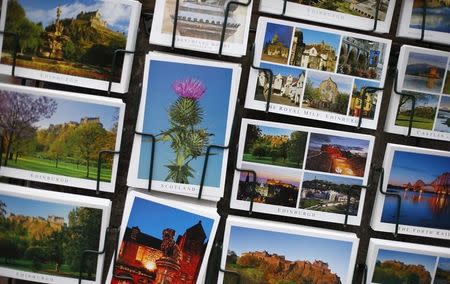Opposing Scottish independence camps both appeal to voters' pockets

By Alistair Smout and David Milliken EDINBURGH/LONDON (Reuters) - The debate over whether Scots will be better off if they break away from the United Kingdom intensified on Wednesday, as pro- and anti-independence camps both claimed Scots would be at least 1,000 pounds ($1,700) a year richer. Scotland holds a referendum on Sept. 18 over whether to end its 307-year union with England, and as that date moves nearer the number of people who are still undecided exceeds the majority who want to retain the union. Some polling has suggested that the financial benefits of being in or out could be the deciding factor for many voters. Britain's deputy finance minister, Danny Alexander - sensitive to criticism that the anti-independence campaign had been too negative - said Scots would each be 1,400 pounds a year wealthier if they stayed in the United Kingdom. "By staying together, Scotland's future will be safer, with stronger finances and a more progressive society," Alexander said. "There simply wouldn't be the same level of resources available for public services if Scotland were independent." But Scotland's First Minister, Alex Salmond, also claimed that Scots would be better off after independence, saying it would bring benefits of around 1,000 pounds per head a year by 2029 as an independent Scotland had more power to attract immigrants and boost its productivity. "The latest figures show that by using the powers that only independence will bring we can deliver an independence bonus with increased revenue," Salmond said. An opinion poll in January suggested that just 15 percent of Scots would support independence if it would make them 500 pounds a year poorer, while a gain of 500 pounds would make 52 percent back independence. "There was a strong correlation between relative affluence and how people will vote. The extent to which parties can make voter offers are essential to election outcomes," Martin Boon, pollster with ICM, said. "If Scots are following anything very carefully, then it is this number." Alexander, who is the highest-ranking Scottish MP in the British government, dismissed Salmond's claim as a "bogus bonus" and likened him to a shopkeeper who could not tell customers how much he would charge for his wares. "Mr Salmond has to face up to the fact that what he is proposing is a risky and costly endeavour. If you were buying a product in the shops, you wouldn't trust someone who doesn't tell you what the price is." START-UP COSTS Convincing the public of the true cost or benefit of independence is likely to be a major task for politicians. One major area of dispute is the cost of setting up a new government administration for Scotland. On Monday, Britain's finance ministry said this could reach more than 1.5 billion pounds - about 1 percent of gross domestic product - and criticised Scottish nationalists for not giving a figure. However, Patrick Dunleavy, a professor at the London School of Economics, said on Tuesday that the finance ministry had badly misrepresented his work by suggesting the cost of new public bodies for Scotland could rise to as high as 2.7 billion pounds if dozens of new public bodies were needed. Instead, the total cost was more likely to be in the low hundreds of millions of pounds, Dunleavy said. "Mr Alexander's claims today don't have a shred of credibility. The Treasury has been caught red-handed trying to cook the books," said Scottish National Party lawmaker Jamie Hepburn. Another area of dispute is revenues from North Sea oil, which would be a mainstay of an independent Scotland's finances. Scotland's latest North Sea tax receipts forecast pencils in receipts of 6.9 billion pounds for 2016-17 - more than double the 2.9 billion forecast by the independent Office for Budget Responsibility (OBR). The Scottish government's central scenario assumes bigger increases in production and lower extraction costs than the OBR, as well as an oil price of $110 a barrel compared to the OBR's forecast that they will fall below $100. Some of the assumptions the Scottish government makes, including the fact that production costs are unlikely to increase in line with output, are contested by some industry experts and the Westminster government. Based on these receipts, the Scottish government on Wednesday forecast that it would run a budget deficit of 2.8 percent of gross domestic product in 2016-17, similar to the 2.5-3.2 percent range it estimated in November. The deficit for the whole of Britain at the same time is forecast by the OBR to be 2.4 percent of GDP. The Scottish government said it could be higher if the opposition Labour Party wins power in a UK-wide election in May 2015. The Scottish government's deficit figure is based on it taking a share of the United Kingdom's public debt linked to its population, while Salmond hopes to take less. Even so, a 2.8 percent deficit is far below most other estimates which take a gloomier view of Scotland's ageing population and reliance on diminishing oil wealth. The Institute for Fiscal Studies, a London think tank, estimates Scotland would have a deficit of 5.2 percent of GDP at independence. U.S. bank Citi forecasts a 5.5 percent shortfall. ($1 = 0.5952 British pounds) (Additional reporting by William James and Karolin Schaps in LONDON; Editing by Susan Fenton/Jeremy Gaunt)

